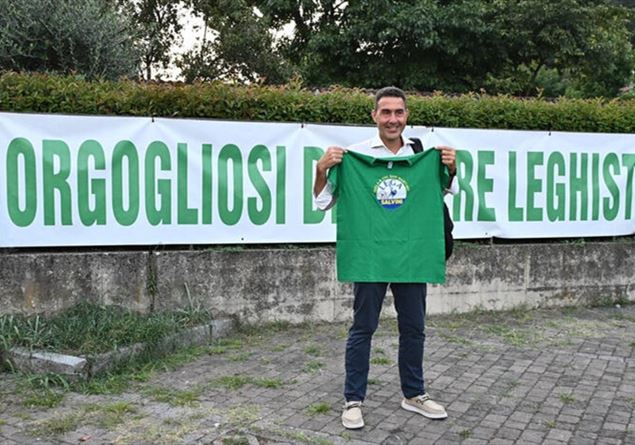Pontida has its rites. Every year, between ampoules of the Po and medieval references, the League dusts off Alberto da Giussano, the hero who was not hero. It is the paladin that would have guided the Lombard municipalities against Federico Barbarossa. The only detail: it never existed. A late creation, a myth built centuries after by reporters with more fantasy than sources. No document, no finding, no chronicle coeval it. Yet, in the League’s Pantheon, Alberto is alive and well, brandished as a symbol and printed on the party logo. As well as the iconography also contained in the symbol of the League, it refers to the monument of the warrior of Legnano, improperly associated – also – to Alberto da Giussano.
This year, in Pontida, deputy secretary Roberto Vannacci has decided to even bring him to the school desks. “The oath of Pontida of 1167, together with Alberto da Giussano, must be taught to the boys,” he said. “Why should we prefer Greta Thunberg who has not combined anything”?- but prefer to who, to an imaginary warrior, a sort of Aragorn (of The Lord of the Rings) in Po Valley?
There is something tender, almost comic, in the idea of proposing Italian students a paper character, as if he were a national hero. It is a bit like inserting Gandalf’s habit or Westeros’ chronicles in the history manual. And however here we are not in a fantasy novel, but in a country that has laboriously built its identity on Manzoni and the Risorgimento, on De Gasperi and on Dossetti.
So what remains of the oath of Pontida? An episode that historians discuss, inflated by the nineteenth -century rhetoric and then transformed into identity myth from the League. A ceremony never documented as it is told today, but capable of inflaming the imagination: the Lombard municipalities that tighten in a sacred pact to defend freedom and autonomies. The epic always works, especially when it serves to give a solemn foundation to a party born on the roundabouts of Varese and raised in the electoral countryside with slogans against Rome thief.
But is this really what should be taught to our kids? History as a novel, the epic as a didactics? Do you really need an Alberto da Giussano who has never been born, never fought, never sworn? It would be more honest to say: “Guys, today we talk about how peoples invent their myths, about how politics uses non -existent heroes to give themselves a face and a blazon”. It would be an interesting, educational lesson.

Instead no. In Pontida, Vannacci invokes a “Padano Catechism “ made of imaginary oaths and ghost knightsto contrast it with real but uncomfortable figures, like Greta Thunberg. Better the invented sword that the protest concrete, better the legend that disturbs little than the science that obliges to change.
The problem is that The ridiculous, when it becomes pedagogy, stops making smile. There is nothing wrong with having foundative myths. Rome has Romolo and Remo, France Giovanna D’Arco. But Alberto da Giussano is not even this: it is a name stuck quickly on a need for roots. As if it were ashamed to say that the real hero of the League is Bossi with the Ampolla del Po, or Maroni with the sweatshirt.
It would be nice that in schools we really talked about history: of the Middle Ages with its lights and shadows, of the municipal autonomies, of the real battles fought by real men. It would be nice to remind guys that identity does not arise from the party logos but from the struggles, from the culture, from the concrete works. Otherwise we risk educating a convinced generation that Alberto da Giussano really existed, like a knight who came from Tolkien’s pages or by Martin’s seven kingdoms. And that Pontida was the Hogwarts of Padania.
It does not build memory on fairy tales, nor on irony. But of course, if we really have to choose, better to read Frodo and Jon Snow than to listen to the nursery rhyme of an never -born knight. At least there the imagination is declared. Here, however, a ghost for history is passed off. AND The boys, who have thin antennas, immediately notice: at school, in Pontida, and also in front of the TV. Because there is always a limit beyond which the myth becomes caricature. And in Pontida, once again, that limit has been widely exceeded.


